by Eugene Simonov and Angelina Davydova
Translated by Jennifer Castner
The authors’ opinions as expressed are solely those of the authors and do not reflect the opinions and beliefs of UWEC Work Group.
This text is a joint publication of UWEC Work Group and Kedr.media.
Modern politicians in Russia often talk about the need to restore the country’s “greatness” and its role in the new structures of a multipolar world, an idea that was used as a partial justification for Russia’s invasion of Ukraine in February 2022. The paradox is that, in the environmental and climatic sense, the Russian Federation has the potential to remain a “great power” and play an important role in humankind’s survival. Significant potential for reducing greenhouse gas emissions, the great role of forests as an element of the Earth’s ecosystem, protecting one-third of the world’s greatest remaining wild, undammed rivers, prudent management of half the Arctic and ongoing development of a unique system of nature reserves – all of these approaches can be of great significance for the survival of humankind and the planet. In starting a war to preserve an old world order, Vladimir Putin effectively eliminated most of these opportunities for Russia and threatened global cooperation. Civil society must now consider a new global environmental role for Russia after the war ends.
Environmental imperative and war
The war that Russia started in Ukraine has deflected conversations and actions in a number of countries away from “thoughts on the essential”: how humanity can survive together on a shared planet. Although it is natural that growing local crises and catastrophes in different parts of the planet can completely change a planning horizon and switch nation-level management and processes over to emergency mode.
Humanity’s survival depends on the extent to which it can put the solutions to growing local crises in service to solving global challenges. In this sense, Russian aggression in Ukraine is a test for humanity.
Overall, by 2023, the dual crises of climate change and loss of the Earth’s biodiversity and their need for a unified system of actions have come into focus for humanity (or, at least, for the bureaucracies that unite it). It is a little less obvious that all other efforts to resolve simultaneous crises must also be coordinated with climate and biodiversity efforts. The role and significance of each country in that work for the future of humankind are largely determined by what each will do (or not do) to solve global survival challenges in the years to come.
This article will examine Russia – the largest country on the planet and one of its least densely populated, a country which started a war to seize new territory and preserve an outdated management system built on quick profit from the sale of energy resources.
Who is the recipient?
Last December, Australian philosopher Freya Matthews published an open letter to Vladimir Putin, “On Greatness”. The essence of the message was that the ways in which Russia is trying to assert itself in the international arena by starting a war are catastrophically outdated, and that the new greatness of nations depends on what they can offer humanity as a contribution to collective survival and cooperation with nature. Russia, the largest country in the world, has very special opportunities and value on this particular path.
In an introductory note, the author of the Russian translation of Matthews’ letter, Viktor Postnikov, harshly and clearly characterizes the situation in Russian society: “This is an outrageous letter. It is outrageous for pro-Putinists, anti-Putinists, left and right, Russophobes and Russophiles, pro-Western and anti-Western people. It is at odds with the views of politicians and the cultural elite. It’s about saving life on Earth. … Of course, the letter is addressed not so much to Putin, but to all free-thinking young people in Russia.”
No one has ever addressed Vladimir Putin on this sort of topic. Moreover, it’s unlikely that any Russian politicians are realistically capable of taking on this new role. While it is possible that the ostentatious “nature-loving” Putin that kissed whales, flew with cranes, and planned to become a Greenpeace volunteer in retirement is partly capable of appreciating such a message, he clearly has other priorities today.


Photos 1-2. Vladimir Putin has publicly kissed many animals in his career. Source: Ura.ru News Agency
“Green” self-awareness in Russia
Over the course of many years the political and economic elites in Russia viewed environmental and climate issues as something less important and peripheral. For them, “environment” was largely equated with “philanthropy”. These are issues that should have been dealt with when baseline questions regarding socio-economic development, efficient extraction and export of resources, and also personal enrichment were resolved.
The trend towards the growing importance of “green” issues in the world, including on the foreign policy agenda, was gradually perceived in Russia as well. During the 2009 United Nations Climate Summit in Copenhagen, where the adoption of the so-called Copenhagen Accord was anticipated (but was only accepted in Paris in 2015, thus becoming the “Paris Agreement”), Dmitry Medvedev, who at that time was the President of the Russian Federation, approved the Climate Doctrine.
In September 2019, the Russian Federation joined the Paris Agreement. At the same time, the threat of CBAM (Carbon Border Adjustment Mechanisms) emerged in the European Union. СВАМ are border payments on goods produced outside the EU in countries lacking carbon regulation systems or a “price on carbon”. In the original version of CBAM, this affected producers of metals, fertilizers, electricity, and cement. For Russia, whose exports are among the most carbon-intensive in the world (and considering that in pre-sanctions circumstances most of these goods were sent to the EU), this meant higher prices for such goods and a decrease in their competitiveness on the European market. Such threats became more and more likely in conjunction with the European Union’s new Green Deal program, and stimulated further measures in Russia in the field of carbon regulation and green policy in general.
Russian delegates have been talking for years at UN climate talks about the world’s failure to recognize the role of Russian forests and more generally about the significant underestimation of the role of Russian ecosystems in “saving global climate”. In light of the prospect of transboundary carbon regulation, their statements have only intensified. Studies and documents also began to appear in Russia, arguing that all natural resources in the world’s largest country (in global territorial terms) can also be considered its “natural” and “foreign political” capital.
This manipulative, self-serving approach to evaluating capital and using that capital remained (and remains) instrumental. Often the essence of these statements boils down to the claim that forests and other Russian ecosystems already do everything that the world needs from an environmental and climatic point of view. And thus there can be no claims or demands (by the international community) of Russia itself.
The maximum that the Russian government is capable of is using that “green” potential as a bargaining chip in international negotiation processes, to continue to receive “green” international funding from multilateral development banks and other international financе institutions and to build further dialogue and international cooperation on neutral “environmental” topics. Recent speeches by Russian Federation representatives at the last UN climate conference in Sharm el-Sheikh in November 2022 are an example of this approach.
In April 2021, Russia’s Higher School of Economics (HSE) released a report entitled “Turn to Nature: Russia’s New Environmental Policy in the Context of the Green Transformation of the Global Economy and Politics”. The report called for a radical update of environmental policy that would not only improve quality of life in the country, but also become a point of convergence with the West.
“Beginning in the 1990s, environmental policy was perceived as a burden in Russia, and sometimes even a threat to economic development,” the report contends. “Most obviously… This is seen in the 2017 National Economic Security Strategy, where development of green technologies is listed among other key challenges and threats to the country’s economic security”. This perspective is primarily due to the fact that such technologies reduce the demand for commodities exported by Russia.
However, the authors of the report called this wording “short-sighted”, noting that green technologies will develop (regardless of Russia), and hydrocarbons will gradually lose their status as a strategic commodity. Building foreign policy and foreign economic policy on outdated pillars must be reconciled with the fact that Russia’s role in the world economy and world politics will inevitably decline.
In the report, the authors also suggested that Russia position itself as an “ecological, clean” power, making the topic of nature conservation a priority area in foreign policy at the level of bilateral cooperation with China, the EU, the United States, and multilateral institutions where Russia is a participant: Brazil-Russia-India-China-South Africa (BRICS), Shanghai Cooperation Organization (SCO), Russia-India-China (RIC), and the Eurasian Economic Union. They propose the adoption of a “global green deal”. In particular, the proposal includes developing rules and tools for global governance that would: “emphasize responsibility for environmental pollution (including in the form of payments by producers and consumers of “dirty” products) and provide real assistance by rich developed countries for the transition of all countries of the world toward a lower-carbon, green economy”.
The report itself put forward a number of fairly sensible proposals for the modernization of green policy domestically, but an emphasis on “image correction” and the need to advertise a “green” component, unfortunately, were not such good ideas. In many ways, this perspective only supported statements and actions by Russian officials when it came down to instrumentalizing the green agenda and ultimately became only a cover, at best, for inaction, and, at worst, serving as a “green” screen for other not very plausible deeds.
In the context of the full-scale invasion of Ukraine, statements by Russian officials at international climate and environmental summits in which they call for continued environmental cooperation “due to its global importance” are unlikely to be taken seriously. In any case, so far there have been no official reactions to such statements.
A recent study by independent news media Meduza of the HSE’s transformation specifically notes that today HSE is pursuing the topic of “potential risks for the Russian economy in the global climate agenda imposed by the West” “in the interests of the Presidential Administration”.
Recent climate policy developments in Russia since the war began
Since the war began, the Russian Federation has formally remained a party to all international climate agreements (including the Paris Agreement) and it continues to declare the importance of the climate agenda domestically and globally. That said, most attractive areas and collaborative prospects within Russian officialdom are seen in “non-Western” countries, and above all in BRICS countries as well as in the Persian Gulf, Southeast Asia, and Africa.
Russia is also employing neocolonial rhetoric, declaring the importance of building a multipolar world and creating a sovereign green and climate agenda not influenced by Western countries. There is also a great deal of talk about increased cooperation with the global South, primarily on technological issues; Russia’s interest in exporting nuclear and exploration and extractive technologies is noticeable here.
At the same time, developing legislation regulating greenhouse gas emissions, conducting events focusing on climate, environmental policy, ESG (environment social and governance), and making political statements are ongoing. But it would be unlikely to talk about real action to reduce emissions or allocate funds for implementation of effective climate change adaptation programs.
To date, stated climate goals – including those set out in Russia’s long-term low-сarbon development strategy (through 2050) and including achieving carbon neutrality – remain on paper only. Development of an implementation plan for this strategy was pushed back to 2023 and may be moved further. A whole number of other legislative acts and standards in the field of environmental protection have been postponed, canceled, or put on hold. Business representatives demand additional cancellations of environmental requirements in difficult socio-economic conditions, and Russia’s access to international green technologies and finance is significantly more complicated. At present, Russia is studying the possibility of accessing non-Western sources of green financing, including in Arab countries and in Southeast Asia, as well as in stock markets where Russian companies also plan to issue green bonds.
Arctic and permafrost
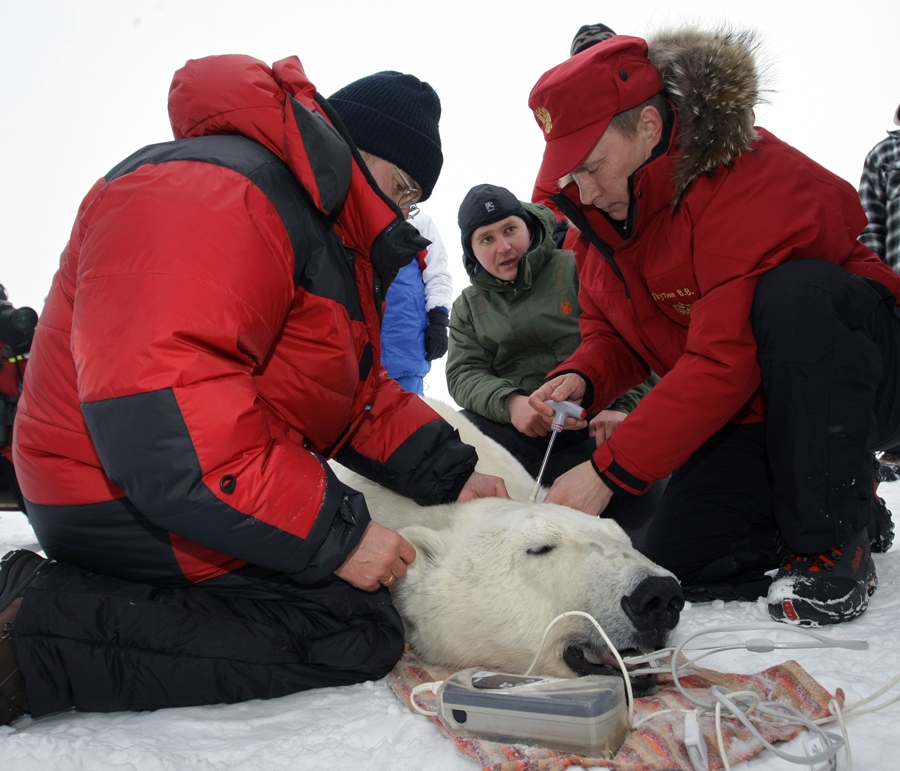
Russia’s Arctic and permafrost are critical “treasures”, but also challenging spots for the country, including in the context of global climate change. Multiyear permafrost melts more and more, resulting in largely uncontrollable feedback effects. The higher the temperature, the more the permafrost melts and releases CO2 and methane. This, in turn, intensifies the global greenhouse effect. The Arctic is warming faster than anywhere else on the planet, and Arctic ice sheets are shrinking – these processes come with global consequences, including for countries at a great distance from the Arctic.
Obviously, in that context, international cooperation is extremely urgent and necessary for humanity’s collective survival. How can international cooperation be aligned with a country that is waging a war?
In March 2022, shortly after the invasion of Ukraine began, other Arctic Council member countries (it includes Denmark, Iceland, Canada, Norway, Russia, USA, Finland and Sweden) announced that they were suspending their participation in that body’s work during the Russian chairmanship. This year, the chairmanship is passing to Norway and the question of the Council’s ongoing work remains open.
Recently, Russia made changes to its Arctic strategy in response to the remaining members’ boycott of Russian Federation leadership of the Arctic Council. Russia no longer regards “observance of high environmental standards” as the most important condition when developing Arctic resources nor does it view cooperation with neighbors as a priority. The remaining priority of “sustainable development” in the text seems to include not only development of the Northern Sea Route (NSR) and building capacity for liquefaction of natural gas, but also construction of a network of small nuclear power plants and development of the Taimyr coal deposit, which produced its first coal in 2022.
Importantly, Russia is already carrying out climate adaptation programs and research that are of planetary significance, and serve as testing grounds for evaluating possible solutions that can later be used elsewhere in the world. Among them are father and son Sergei and Nikita Zimov and their “Pleistocene Park”, an initiative seeking to restore highly productive natural rangeland in the Arctic region.
The project’s main idea is to release large mammals (musk oxen, deer, bison, Yakut horses, yaks, etc.) in today’s tundra, the presence of which may result in the formation of steppe plant communities that last dominated the Arctic millennia earlier. It is this project that Freya Matthews describes in her “Letter to Putin” as an example of Russia’s possible contribution to climate efforts. In her opinion, an important outcome of the project is that herds of herbivorous animals will trample snow cover and thus facilitate deep freezing of the soil in winter. Steppe grasses reflect the sun’s rays many times more effectively while absorbing significantly less heat, but store more carbon than wetland-shrub vegetation on the tundra.
All of these processes increase permafrost resistance to global warming processes, slow biological decomposition of organic matter, and thus prevent the formation and release of greenhouse gases.
A second example is climate adaptation and biodiversity conservation programs in Russia’s Arctic regions (specifically in Taimyr, in Murmansk, Nenets Autonomous Okrug, and previously also in Chukotka) developed and implemented by World Wildlife Fund in Russia (WWF-Russia), an organization recently recognized by Russian authorities as a “foreign agent”. Initiatives underway include local community programs that support Indigenous population. They receive support in the form of security, climate change adaptation practices, and development of new types of economic activity. Prior to being named a “foreign agent”, WWF-Russia also conducted educational activities with schoolchildren and helped develop local regulations related to climate change adaptation.
Strictly protected scientific nature reserves: a Russian contribution to global biodiversity conservation
Russia has made an important contribution to global biodiversity conservation in the form of creating a network of strict scientific nature reserves (zapovednik in Russian): territories where the natural course of environmental processes and the entirety of all species living there are strictly protected, accompanied by continuous study of those natural complexes. The first such was Barguzinsky Reserve, established in 1916. Today, 103 reserves protect over 300,000 square kilometers of nature. Five additional reserves are located on Ukraine’s Crimean Peninsula, which Russia stubbornly continues to claim.
Conservation of ecosystems for the purpose of studying the processes occurring therein is a fundamental task for reserves, one that is quite distinct from the United States’ national park school of thought, institutions intended to be accessible to the public and that educate the public. The practically unattainable ideal of “absolute protection” nevertheless became Russia’s most important landmark and contribution to shared international environmental thought (and practice). The International Union for the Conservation of Nature’s (IUCN) classification of protected areas today includes Category 1a “Strictly protected scientific reserve” (in other words, a zapovednik), which is the most advanced form of protection for natural landscapes.
Over the century of its existence, the Russian reserves system has experienced several waves of contraction (primarily under Stalin and Khrushchev), more than a few scandals related to the use of remote territories for trophy-hunting or private gain, and periods of acute budget crises, but in general it has turned out to be one of the most effective forms of nature conservation.
Now, in light of the global scale “30 by 30” initiative that seeks to protect 30% of terrestrial and marine territories and restore disturbed natural processes in another 30% of Earth’s ecosystems, Russia – with its vast and sparsely populated territories and a century plus of conservation traditions – could become a world leader. Only 17% of the country’s territory lies within a protected area and there are fewer objective obstacles to their creation than anywhere else in the world.
In November 2014, Russia made a bid for “nature reserve greatness” by opening the richest and most informative pavilion at the World Parks Congress in Sydney. Despite that, Russian representatives were nevertheless questioned about Crimea’s annexation and not about the management of nature reserves.
In just the last two years, Russia has been actively giving up its environmental positions, weakening protection of Lake Baikal and other World Heritage sites, carving out lands within strictly protected areas and national parks for the construction of summer cottages and hotels, and weakening laws on protected areas. In March 2023, following President Putin’s clearly stated position, the State Duma adopted a law ensuring the prioritization of tourism development in all protected areas, including zapovedniks. A protest issued by the Expert Council on the Nature Reserves fell on deaf ears in the legislative Duma. Instead of improved regulation of environmental education activities, the bill focused on facilitating the transfer of territories to “investors” for the establishment of tourist facilities.
Such a poorly designed initiative will put an end to more than a century-old tradition of conservation work, radically changing and reordering priorities. The reason for this is the desire to develop domestic tourism as quickly as possible in order to compensate the population for the reduction in opportunities to travel abroad. The second reason is a search by pro-government elites for new sources of income to replace those driven downward due to sanctions and resource depletion.

Russia – the most forested country in the world
Northern forest ecosystems are enormous but minimally productive, not to mention being significantly affected by fire and excessive logging. Nevertheless, they comprise a majority of forest ecosystems on the Eurasian continent and play a critical role in supporting balance in nature on a planetary scale, particularly when it comes to long-term carbon sequestration.
In recent years, greenwashing-style “climate manipulations” have unfortunately gained in popularity. Instead of actions to meaningfully reduce greenhouse gas emissions, corporations and states promise to “increase the absorption capacity of forests”. Most of these commitments are false promises and often involve damage to natural ecosystems, for example, in the case of creating forest plantations in steppes.
A recent example is an investigative journalism piece published at the start of 2023 in which both The Guardian and Die Zeit participated. Its authors found that 90% of the carbon offsets (emissions offset projects achieved primarily through tree planting in the Global South) confirmed by Verra Carbon Standard (the largest independent verification company) had almost zero climate results and could indeed have resulted in additional emissions of greenhouse gases. Disney, Shell, Gucci, and others acquired comparable compensatory emission reduction units.
Russia also attempted to enter onto this playing field, announcing that the country also received an undeserved place among the leading countries in “net emissions” of greenhouse gases as a result of a “mistaken calculation” about the global role of Russian forests. To prove this, Russia developed a new methodology to calculate greenhouse gas absorption by forests and other ecosystems.
Political manipulation devalues good intentions. The campaign to “redefine the role of forests” has coincided with an increase in wildfires driven by warming temperatures, droughts, and poor forest management. In 2023, Krasnoyarsk scientists published studies clearly showing that poorly protected forests in Siberia are less and less able to absorb greenhouse gases. Some forested areas already have a negative balance, in other words, they emit greenhouse gases. If these trends continue, their share will grow rapidly.
A number of actions are needed to remedy the situation: halt logging in undisturbed forests, establish effective fire protection measures, and stimulate highly productive forestry on abandoned agricultural lands, of which there are more than 70 million hectares in Russia.Unfortunately, Russian forestry is moving in exactly the opposite direction. Unlike many countries in the world, Russia has not set a goal to end logging in natural forests, and supporting development of forestry on abandoned arable land was blocked in 2022. Owners of agricultural land overgrown with secondary forest are faced with the dilemma of cutting (or burning) the forest or giving up their plots. It should be noted that this topic, as well as that of sustainable forest management and preventing and fighting forest fires in general, was a key focus area for Greenpeace for many years in Russia. Greenpeace’s activities were labeled “undesirable” by the Russian government at the end of May, resulting in the organization announcing the end of its tenure in that country.
Empire of free rivers
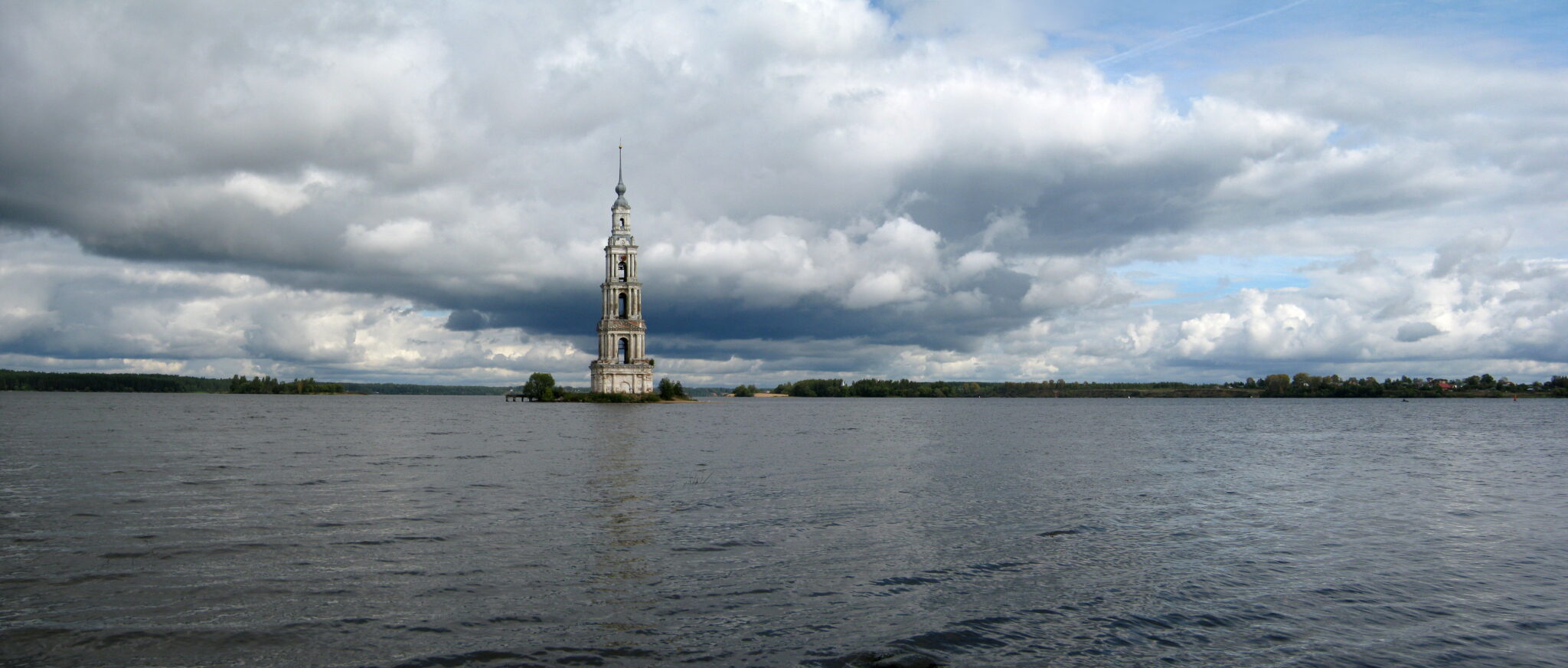
“Conquered” Volga River. Nikolsky Cathedral in Uglich Hydropower Reservoir. Source: V.Pakhomov. Wikimedia
What other ecosystem riches does Russia possess that are of global importance? All over the world, there are only four dozen rivers longer than 1000 km that remain undammed in their main channel and, accordingly, have preserved natural cycles for fish migration, sediment runoff, periodic flooding of floodplains, wetlands maintenance, etc. These support the most critical ecosystem function, and in particular, supply fish to the most needy and vulnerable population groups.
Russia is home to one third of the world’s largest free-flowing rivers: the Lena, Amur, Tunguska, Olenyok, Yana, Indigirka, and half a dozen other mighty rivers. These rivers are not only the foundation of natural resource use by Indigenous peoples of the North, they also support natural water regimes in oceans, especially the shallow Arctic Ocean.
On 30 December 2022, Russia adopted an energy development program that once again includes the construction of large hydroelectric dams, including previously unaffected rivers – the Tom, Timpton, and Selemdzha. There is no economic sense to be found in these construction projects; instead they are intended to “preserve competencies in the field of renewable energy”. Russia has many fewer competencies when it comes to creating wind farms and solar arrays that are less damaging for nature.A few years ago, Russian scholars were commissioned by the Russian Hydropower Association to produce research justifying the construction of hydropower infrastructure. The researchers found that, unlike in other corners of the world, gigantic reservoirs supporting Russian hydroelectric power stations do not emit, but rather absorb greenhouse gases. Such a conclusion seems very doubtful, because it is well-documented that artificial reservoirs emit significant GHG emissions (primarily methane), and in particularly large amounts in the first decades after filling.This phenomenon has attracted the attention of policy makers recently, leading to the addition of hydropower and other reservoirs to GHG accounting and reporting systems.
Does Russia have a future “green greatness”?
It is more or less obvious that while the war continues, all talk about Russia’s future role in the survival of humankind is rather abstract. Today, Russia has contributed significantly to undermining the building blocks of human survival, including by bringing death and destruction in the literal sense of those words. In addition, the war started by Russia has launched a new round in the global arms race, a process which radically shifts resources and attention away from solving global problems. In all the most important areas that determine Russia’s environmental significance in the world, environmental conservation rollbacks and degradation are more likely to be observed than progress.
War and corruption are two determining factors which, when multiplied by the internal colonial nature of the country, presume the extraction and redistribution of natural resource rent as the leading process for cementing Russia’s social structure.
As long as the basis of the country’s political economy remains – divvying up (natural) resources among the elites and the corrupt – a transition to the “sustainable development” model is impossible in principle. For such a transition to occur, it is necessary that the preservation and enhancement of human capital, nature, and ecosystem services be perceived to be of greater value than the extraction of raw materials and the development (or capture) of new territories.
Some day the war will end and new Russian authorities will be forced to seek their place in the global division of “labor and glory”. So this conversation is not useless; civil society needs to have answers to these questions. Preparation for the “after” is important and necessary right now.
Conversations must begin today about support for and further professionalization of environmental activists and experts in civil society, maintaining at least informal international contacts with civil society representatives and individual scientists. Development of further alternative models of “green” development, particularly in the context of global climate change, is another essential topic for discussion, as are discussion of their potential contribution to global thinking and dialogue about global development as a whole.
Voices from “unofficial Russia”, are critical to these discussions: members of civil society organizations, the scientific community, journalists, publicists, and thinkers located both inside the country and those in self-imposed exile all around the world.
Main image source: Wikimedia

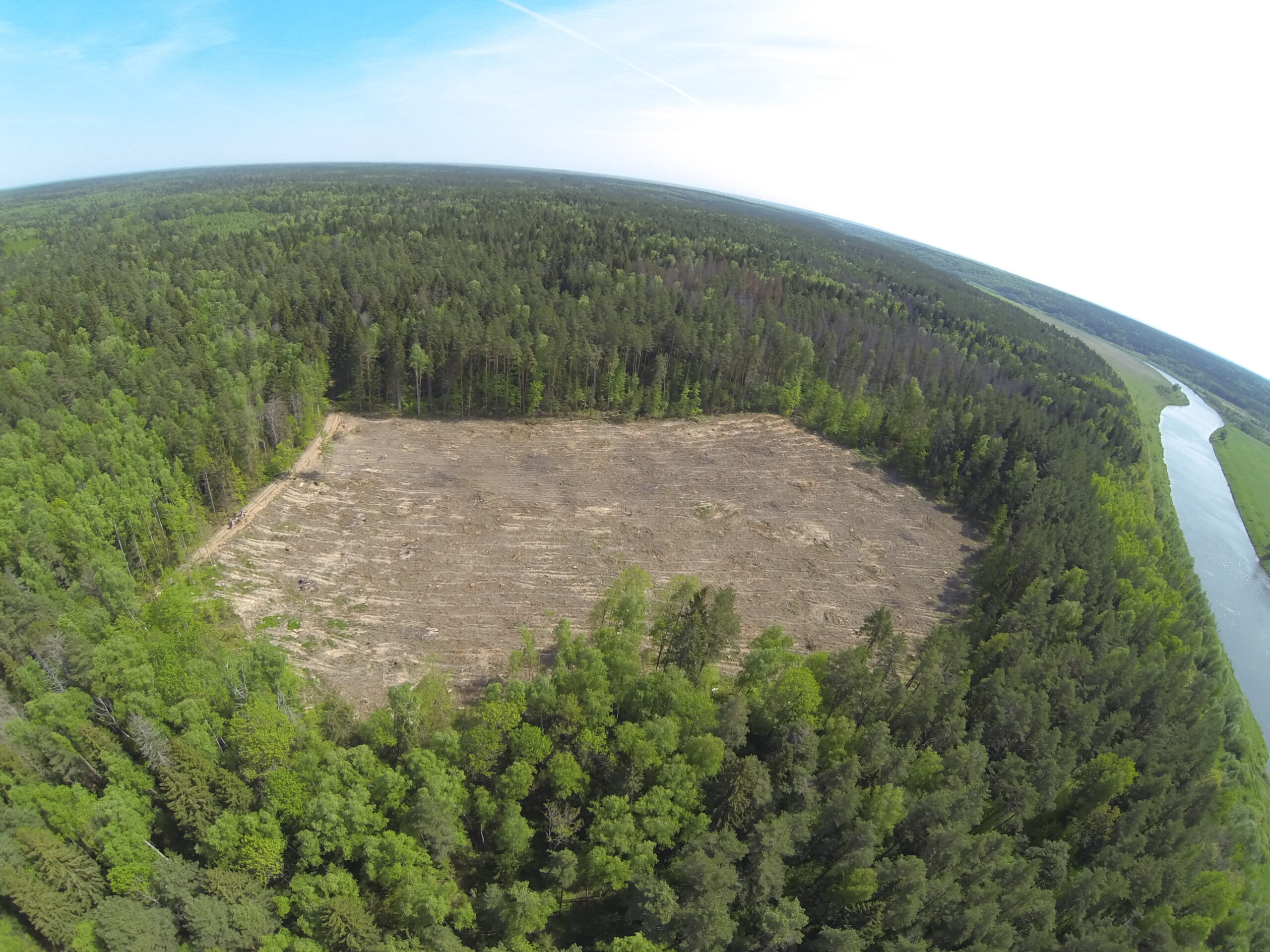

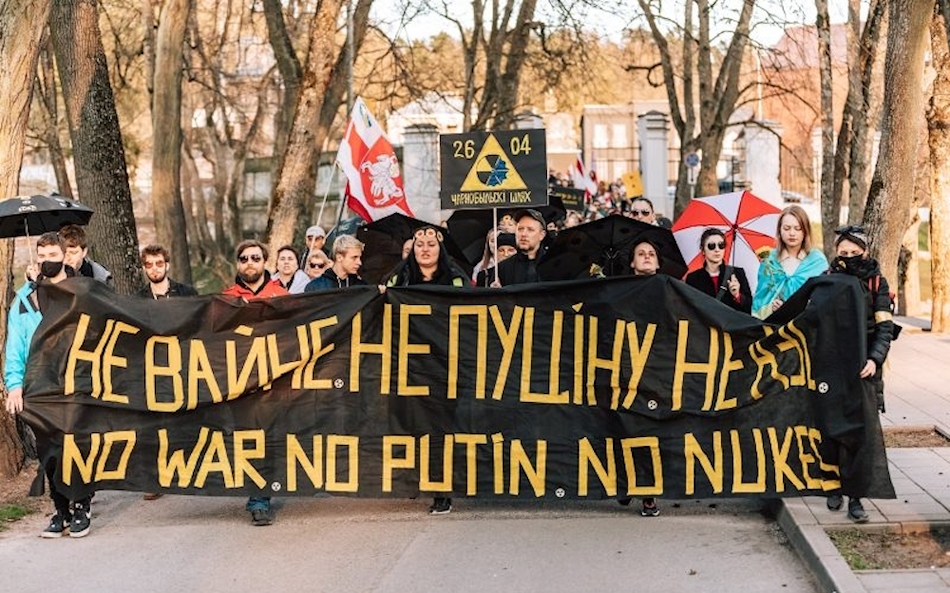



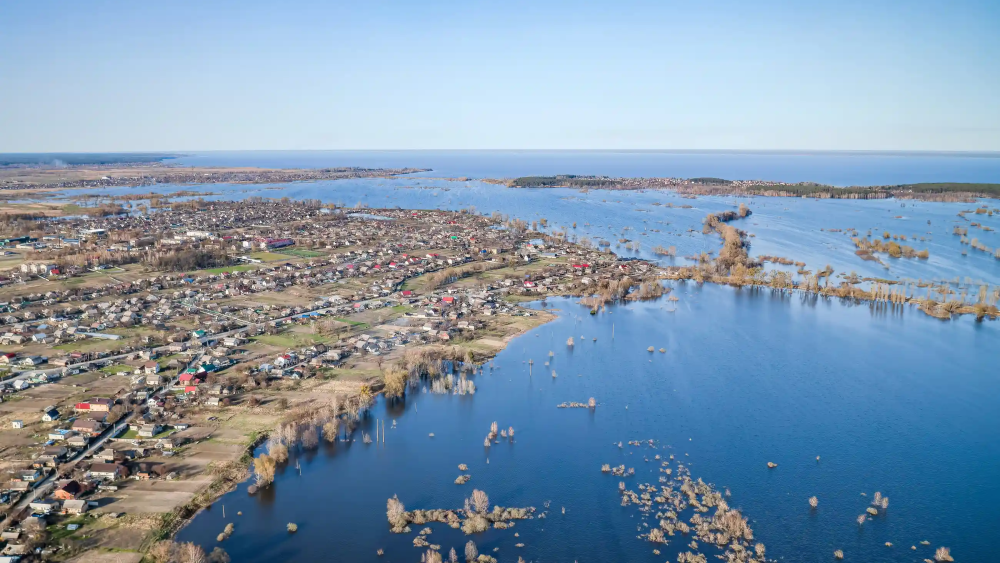
Comment on “Does Russia have a “green” future?”